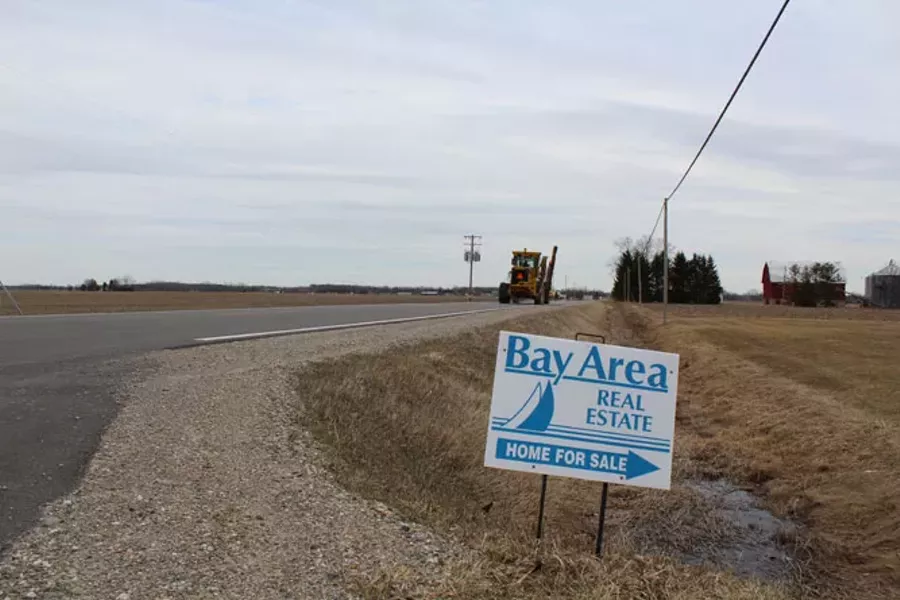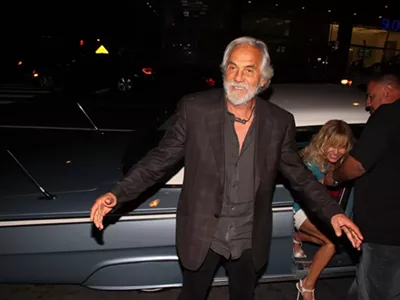
Frank Gallagher is pulled up to his bedroom desk in his wheelchair scribbling notes down on a pad of paper when we arrive at his house on a Thursday in early March. The 31-year-old medical marijuana caregiver has spent the better part of his week in this spot, trying to find out which southeastern Michigan cities may adopt marijuana ordinances allowing for large-scale commercial grows.
Gallagher flips through the pages in his pad and rattles off the responses he's received:
"Royal Oak Township, no. Oak Park, no. Berkely said they don't have much zoning for it. Madison Heights, no. Clio, where they do the Cannabis Cup, they said FUCK no."
So far, there are 20 cities on his "called" list. The list will only grow until he hears with some certainty that a city is willing to welcome his business.
Gallagher is trying to navigate the new regulatory framework for Michigan's medical marijuana industry before the rules fully take effect next year. He's been growing marijuana as a registered caregiver since Michigan voters approved the substance for medicinal use in 2008, a change that could not have come at a more opportune time. The year before, Gallagher was paralyzed from the chest down in a snowboarding accident. Wheelchair-bound and seeing a business opportunity in the potential legalization, he quickly got to work collecting signatures to help get the measure on the ballot.
Since passage of the proposal, Gallagher's primary source of income has been the 72-plant basement grow that serves him and five other patients. But he says medical marijuana was his saving grace for more than just financial reasons.
"I did it for myself initially so I could have medicine," Gallagher says, "but I found that growing anything is seriously therapeutic. I also essentially learned how to run a business."
But now, with new laws that legalize dispensaries and massive grow operations looming, that business is in jeopardy, and Gallagher says he's left with two options: Take it to the next level or get left behind.
"The state doesn't want you to sell to anyone beyond your five patients unless you have a license," says Gallagher. "So if you really want to make a living, you have to move into the 500 plant realm."
Under a package of reform bills passed last year in Lansing, newly legalized dispensaries will be supplied exclusively by marijuana produced at state-licensed commercial grows. That means caregivers like Gallagher will no longer have a place to sell their excess product, of which there is plenty. The 2008 medical law was written in such a way that it allows caregivers to grow 12 plants per patient, though a single patient can only possess 2.5 ounces of marijuana. One plant, Gallagher says, can yield that much alone. (Because selling the resulting overages is technically illegal, we've agreed to obscure Frank Gallagher's true identity.)
But Gallagher cannot jump right into the new system; first, he has to figure out which Michigan cities will even allow large-scale marijuana growing.
He picks up the phone to call Troy.
"Hi, I'm calling to inquire about commercial licensing changes to marijuana," he says, taking on a soft and polite tone.
Gallagher is told to call back and hangs up. We note his attempt to muster a professional pitch.
"Absolutely, have to," he says, ebullient again. He releases his wheelchair brake and scoots back from his desk with a grin.
This is likely the lowest hurdle Gallagher will encounter as he attempts to gain his footing in an industry Michigan's House Fiscal Agency estimates will generate more than $800 million a year.
The costs associated with running a large-scale commercial grow are enormous, with former Rep. Mike Callton (R-Nashville), who sponsored the main marijuana reform bill, putting the price tag at about $1,000 per plant. By that estimation, people who obtain a Class C grower license that permits them to grow the maximum 1,500 plants will need to have a $1.5 million budget. Gallagher, who is seeking to obtain a Class A license for a 500 plant grow, says he's looking at $100,000 just for equipping a grow facility with lights and other necessities. Actually buying the site, he estimates, will cost anywhere from $150,000 to $1 million, depending on how many cities adopt ordinances and the subsequent demand for real estate.
Fees associated with simply obtaining a license will require him to pay up to $10,000 to the state and up to $5,000 to the municipality he chooses to do business in. He'll also have to pay to comport with lab testing, secure transport and seed-to-sale tracking requirements, and obtain $100,000 of insurance for his grow. This could mean paying higher premiums, as major multi-state insurers have, for the most part, been unwilling to insure marijuana-related businesses because the substance remains illegal under federal law.
Such costs and the inability to sell to dispensaries will likely render many of the state's 40,000-plus caregivers incapable of entering the medical marijuana industry in its new iteration.
"I worry for them because that's how they make their money," says Benjamin Horner of the Flint-based nonprofit Cannabis Stakeholders Group. "That's how they pay their mortgages and what they tell me is, 'We're just gonna go underground.' And they're gonna get busted."
Horner, who owns a dispensary in Gaylord, is among many small-marijuana-business owners across the state who believe that those who've built the industry in Michigan over the past eight years weren't given enough say during debate over the overhaul laws. Horner says his Cannabis Stakeholders Group had lobbied for passage of medical marijuana reform bills introduced in previous legislative sessions, but abandoned those efforts upon discovering the number of regulatory hurdles in the package of bills introduced in 2015.
"Some things [in the laws] seemed geared toward special interests," he says. "And let's face it: What in Michigan happens without special interests being involved?"
When Callton, the former state representative, first introduced a bill to reform the state's largely unregulated medical marijuana industry in 2012, he was mostly aiming to address a gaping hole in the law that did not allow for dispensaries. Dispensaries, Callton felt, could serve as a pharmacy of sorts for patients, because, in his words, "What other medicine do you have to grow on your own?" Legalizing dispensaries would also help diminish reliance on caregivers, the number of which was by then in the tens of thousands. Most states with medical laws on the books had fewer than 3,000 caregivers as of last year.
"The problem you see with the Michigan Medical Marijuana Act is that you're growing in the neighborhood and neighbors smell it," Callton says. Law enforcement sources say this, in turn, leads to increased calls to police and increased policing of medical marijuana. Michigan State Police data show the number of marijuana related arrests has grown since the law was enacted, with the latest numbers on record up 11 percent from 2008.
Callton's bill died the first time around and was reintroduced in the following legislative session. By then, the industry had grown so much and, as evidenced by numerous court cases, was the subject of so much confusion that Callton says lawmakers began to face mounting pressure to act. He says the governor's office and county and municipal associations also saw a need to weigh in on the matter, but without police groups at the table, the bill was again shot down.
Things changed in 2015, when not only did police finally join the debate, but potential investors and business interests sought to have their say as well.
Money that year began to pour into the campaign coffers of Callton and other lawmakers who would shape the reform. According to financial disclosure information compiled by the Michigan Campaign Finance Network, or MCFN, Senate Judiciary Chairman Rick Jones received nearly $17,000 from medical marijuana interests last legislative session; House Judiciary Chairman Klint Kesto received almost $14,000; Senate Majority Floor Leader Mike Kowall received $4,500; and bill sponsor Callton received just over $5,000.
Those involved in the debate spent even more lobbying, according to MCFN. The Michigan Cannabis Development Association spent at least $77,000 on lobbying ahead of the bill's passage, the National Patient Rights Association spent at least $29,000, the Prosecuting Attorneys Association of Michigan spent at least $77,000, the Michigan Sheriff's Association spent at least $12,500, and the Michigan Distributors and Vendors Association spent at least $113,000.
However, it's unclear how much of each of those totals was put toward the medical marijuana debate.

"In Michigan our lobbying laws don't require lobbyists to disclose what bills they're trying to influence, so all we can do basically is ... see what lobbyists and what groups are expressing which positions on bills, and then see how much they spent," MCFN executive director Craig Mauger says. "This is especially problematic in situations like this, when lawmakers are laying the groundwork for a new industry and we the public don't even get to see who is influencing the rules for that industry."
For the most part, the stakeholders who spent big last legislative session are happy with the medical marijuana rules that emerged.
"I think it creates a good opportunity to create a cottage industry," says Mike Lumetta, who is on the board of directors for the Michigan Cannabis Development Association. "You know, mom and pop shops and small businesses; a chance for start-ups to occur."
We ask about the caregivers worried for their futures.
"[Caregivers getting squeezed out of the industry] was actually a big concern of ours too, which is why we pushed for the tiered system," Lumetta says, referring to the different classes of grow licenses available. "In my opinion, as a caregiver myself, going from 72 to 500 plants is not an insurmountable jump." He also notes that caregivers looking to move into the new system have the option to obtain a 500-plant license and gradually increase the number of plants they cultivate.
The Michigan Distributors and Vendors Association, which represents tobacco wholesalers in the state, also supported the bills. The group's president, Polly Reber, tells Metro Times tobacco wholesalers may get involved in the distributive work the laws create, like securely transporting the substance, and, if a draft legalization ballot initiative for 2018 is passed as is, tax-stamping and collection services as well. The group, in addition to money it may have spent lobbying on behalf of medical marijuana, donated a small sum to Callton the day his medical marijuana bill passed the House. The former lawmaker says tobacco and alcohol interests were pushing for marijuana to operate under the same three-tier system that regulates other controlled substances in the state.
"There was financial pressure from these industries," Callton says. "But if you look at the distribution systems, these people in the middle are big, and there's not many. This is gonna [eventually] be a multi billion-dollar industry and when you see only a few people take control of the distribution piece, they're gonna make billions."
‘The dollar signs are in their eyes. That seems to supersede whatever they believed about cannabis up until this point.’
tweet this
Callton says lawmakers resisted the push to create a central distributor — in essence, a middleman who would own the product — in an effort to protect the "small guy" involved. When asked why the new regulations require a secure transporter to, for a fee, shuttle marijuana from grow site, to lab, to dispensary, he calls it a "necessary evil" included to satisfy police. National Organization for the Reform of Marijuana Laws deputy director Paul Armentano says he knows of no other jurisdiction with such a requirement, and notes that there's no secure transport rule in place even at the federal level with regard to moving federally grown cannabis to research sites across the country. Says Armentano: "The [rule] would seem to be more applicable to plutonium rather than cannabis."
While the new laws don't create a distributorship, the system is tiered, with each level unable to have a stake in another. For instance, marijuana producers aren't permitted to have ownership in a dispensary or processing entity that makes non-smokeable forms of marijuana like edibles. Similarly, the owner of a lab testing facility or secure transport company would not be able to have a stake in a retail site or grow operation.
But many members of the medical marijuana community fear the same forces that sought to create a distributorship system through last year's overhaul laws are aiming to increase the role of middlemen through a 2018 legalization effort.
A draft proposal by the Coalition to Regulate Marijuana Like Alcohol, or RMLA, seems to, at the very least, anticipate a broader role for companies involved in the secure transport of marijuana. Its language instructs the department that will regulate marijuana to accept applications "from persons holding a state operating license for a secure transporter ... who have experience transporting products upon which an excise tax is collected, remitting excise taxes to the department of treasury, and applying tax stamps." The description mirrors the duties of the state's tobacco wholesalers.
"It sets up this scenario where the infrastructure for a distributorship is created," says Jamie Lowell, a board member with MI Legalize, the group that was behind an unsuccessful effort to put the legalization question to voters in 2016. He's also helping draft the RMLA proposal, but opposes it in its current form. "If you look at these exclusionary licensing requirements, it's hard to imagine who all has those credentials except ten or twelve companies. This is where the special interests come in. They're paying for exclusivity for that segment of the market."
So far, donations to the group mounting the 2018 legalization effort have been massive. While MI Legalize secured only small donations in its infancy as a ballot committee, the Coalition to Regulate Marijuana Like Alcohol has received nearly $130,000 in contributions, almost all of which has come from three donors. They are "Smokers Outlet Management," or Wild Bill's Tobacco, a real estate developer out of Lansing, and the head of a Gaylord-based electric company.
Meanwhile, alcohol and tobacco interests sit at the drafting table, according to sources with knowledge of the situation. A lawyer for Wild Bill's Tobacco is helping craft the regulatory framework for legal marijuana, should it be approved, as is a lawyer from the wine and spirits industry named Jared Rapp. Rapp's LinkedIn profile shows he runs an alcohol marketing company called Frê Spirits. His list of specialties includes "alcohol distribution."
It's not lost on Lowell that forces that have historically fought against the legalization of medical marijuana are now taking a different tack.
"The dollar signs are in their eyes," he says. "That seems to supersede whatever they believed about cannabis up until this point."
But despite having alcohol and tobacco interests at the drafting table and big money forces donating large sums to the RMLA effort, ballot group spokesman Josh Hovey says everyone involved in the legalization effort has "the same goal."
"At the end of the day, the coalition is dedicated to passing the most progressive initiative possible and we think the language under draft right now will position Michigan as the most progressive in the country," says Hovey, who pointed to language that will give people convicted of marijuana crimes in the past paths to clearing their records. The proposal would also create a 150-plant grow threshold beyond the Class A-C licenses available under the new state rules.
Still, such provisions do not provide enough comfort for Lowell, who says his primary concern is limiting the special interest forces behind potential legalization so that Michigan's marijuana industry can provide "an opportunity for everybody." If the RMLA proposal receives approval in its current form, Lowell says MI Legalize will consider spinning off and mounting its own legalization effort once again.

Two hours north on I-75 from Detroit, beyond the Zilwuakee Bridge, a rural town that's moved quickly to enter the commercialized medical marijuana industry is preparing for a green rush.
A McDonald's, a cheese shop, and wide swaths of farmland line the main strip off the freeway in Pinconning Township. Those in charge of the 42-square-mile township of 2,500 people envision the area will soon be transformed into a hub for marijuana growing, processing, and retail.
"We had three options," Pinconning Township Deputy Treasurer JoAnna Morin says in reference to the medical marijuana industry. "Do nothing, don't allow it, or control it."
Faced with an economic opportunity unseen in decades, the township — already known by the marijuana community as home of the "Pinconning Paralyzer" strain — went with the latter approach. In January, it became the first Michigan municipality to adopt a marijuana ordinance allowing for commercial medical marijuana facilities. So far, ordinances have been adopted by what appears to be fewer than a handful of places, all of them rural.
Morin says most of the people eyeing Pinconning Township for marijuana work are from urban areas like metro Detroit, where zoning issues have left cities unlikely to adopt ordinances that allow growing. Gallagher, after more than a month of making calls to gauge the temperature of city planning directors in southeastern Michigan, is starting to realize he'll likely have to take his business north.
"I'm looking at having to drive up to an hour both ways every day, whether it's an agricultural community all the way out in Lapeer [County] or a rural area around Lansing," he says. "But what I keep hearing from [city officials in these places] is 'We like the idea, but we move really slow.' Whether or not they're gonna be on board in December is to be seen, so I can't even pick a place yet."
With only a handful of Michigan cities to choose from, marijuana interests have been keeping agents busy at Pinconning Township's lone real estate office.
"We're gonna be a main attraction! Who knew?" says Hallmark Real Estate's Alana Walczak, whose family has worked at the firm since the '70s. Her sister, Pamela Walczak, has been fielding most of the calls from people looking to buy in the area now zoned for marijuana growing, processing and retail. "We're expecting it will bring a lot more money into the area," she says.
The price of real estate in the 6-square-mile stretch that will make up Pinconning Township's marijuana district has spiked, with undeveloped farm land going for $200,000 an acre, according to one for-sale listing. More money will have to be spent to actually build marijuana facilities on that land. Pamela says she's been buzzed by many who have no idea of the investment involved.
"There are some people when you're talking with them, they're just the ones that are probably used to growing in their basements, and when you're looking at how much they're looking to spend they just don't have the capital," she says.
"Some people don't have a clue," Morin says at the township hall. "I had a guy call me and say, 'Hey I got your application, I'm gonna bring it up and I'm coming up this weekend to get a place to rent.' I said, 'Have you ever been here? There's no places to rent!' I was just shocked by that, he really didn't do any homework."
As a lack of knowledge or money (or both) weeds out entrepreneurial hopefuls, Callton says the commercial medical marijuana industry is taking shape just as he envisioned.
"It's just like any other commercial enterprise," he says. "You need to have money to finance it." He went on to describe those who complain they can't afford to enter the industry as "whining."
"You do have some multi million-dollar groups that are gonna get involved, but it is still there for the mom and pop families," he says. He suggests people looking for a cheaper alternative than growing can get involved in the processing or retail elements of the industry, though he noted that even then, "they'll need a couple hundred thousand bucks."
Those with marijuana know-how who are savvy enough to navigate the inroads to the commercialized industry say they'll likely have to band together or team up with investors to take their businesses to the next level. Gallagher, who right now only has about $20,000 saved, plans to recruit a partner to purchase a facility or find one for rent. He says he'll work on building out his 500-plant grow in stages. Then, in December, he and others will present their business plans to a yet-to-be-appointed state board in hopes of obtaining licenses.
Having already been approached by several prospective investors, Gallagher is confident he'll prosper in the commercialized medical system that will eventually likely serve as the foundation for a recreational market. But he's not so sure about his peers.
"Money wins every time," he says. "You have your institutions, your large investors, and then you have guys like me who've been in it and know how to do it. If we don't get in, we're just gonna have to hope to [serve as a] microbrewery for cannabis connoisseurs."
But that, he concedes, will involve illegal sales should caregivers continue to use marijuana as a way to make ends meet.
This post was updated on Saturday, May 6 to reflect that a major donor to the Regulate Marijuana Like Alcohol legalization effort runs an electric company based in Gaylord, not Saginaw.







